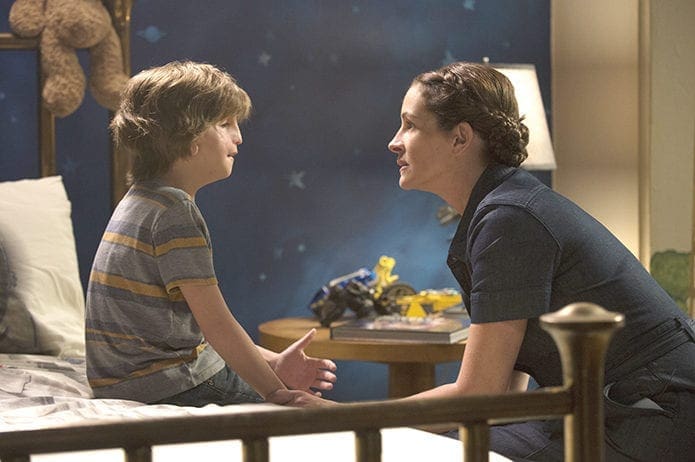 CNS photo/Lionsgate
CNS photo/LionsgateNew York
The ‘Wonder’ of everyday heroes depicts ‘significance of everyday life’
By CATHOLIC NEWS SERVICE | Published November 28, 2017
NEW YORK (CNS)—“Wonder” (Lionsgate) is a beautiful film about ugliness. Its protagonist is August “Auggie” Pullman (Jacob Tremblay), a 10-year-old boy born with facial deformities whose misshapen visage becomes a moral Rorschach test for the people around him.
This gentle, moving drama centers on Auggie’s struggle to win acceptance from his peers as he transitions from being educated at home to attending the fifth grade of his local middle school. But it also explores the lives of his supportive parents, Nate (Owen Wilson) and Isabel (Julia Roberts), and his loving older sister, Via (Izabela Vidovic).
Via gives Auggie unstinting affection despite the fact that his emotional needs have left her feeling overlooked by Mom and Dad.
Though reluctant to subject Auggie—who usually goes out in public wearing an astronaut’s helmet that conceals his face from view—to the potential ordeal of school life, Nate and Isabel know it will be the best thing for him in the long run. They find an ally in Auggie’s principal, Mr. Tushman (Mandy Patinkin), a rabbi-like figure who serves as the movie’s ethical core.
As for Auggie’s fellow students, their attitudes range from the open friendliness displayed by easygoing Summer (Millie Davis) to the cruel hostility embodied by would-be top dog Julian (Bryce Gheisar). Somewhere in the middle is Auggie’s on-again, off-again pal, Jack Will (Noah Jupe).
Though fundamentally kind and, eventually, genuinely fond of Auggie, Jack is case study in subtle variability and the negative effects of peer pressure. When circumstances enable Auggie to overhear some heartless remarks about him that Jack makes simply in order to fit in with the crowd, the effect is devastating. A later scene in which Julian comes to recognize the full impact of his bullying also carries a wallop.
Subplots involving Via’s best friend, Miranda (Danielle Rose Russell), and newfound love interest Justin (Nadji Jeter) reinforce the idea that all of us are potential heroes or villains. Though some of the people in Auggie’s world are wholly good—his parents and Justin, for example—no one is presented as irredeemably wicked.
In adapting R.J. Palacio’s 2013 best-seller, director and co-writer (with Steven Conrad and Jack Thorne) Stephen Chbosky has created a winning and memorable film about the significance of ordinary life and the lasting impact of everyday choices. Despite a few mature elements, the movie’s valuable lessons make it appropriate fare for most teens.
The film contains a scene vaguely referencing married sexuality, fleeting scatological material, a couple of fistfights, one use of profanity and a single mildly crass term. The Catholic News Service classification is A-II—adults and adolescents. The Motion Picture Association of America rating is PG—parental guidance suggested. Some material may not be suitable for children.
“Lady Bird” (A24)
Writer-director Greta Gerwig’s sensitive autobiographical account of growing up in Sacramento, California while testing her boundaries with both her family and her Catholic school is pleasing in some respects but teeth-grating in a couple of others. In particular, a sexual encounter in which the title character (Saoirse Ronan) is a bit shy of her 18th birthday necessitates a restrictive classification. Gerwig herself is not Catholic but attended a Catholic high school, and Lady Bird, although it’s not made explicit, is in the same situation. She’s not rebelling against church teachings, though, as much as life in general and her place in it. There is a redeeming wrap-up, but the problematic material that precedes it, including scenes dealing with homosexuality and the moral status of abortion, requires thoughtful discernment by grown viewers well-grounded in their faith. Underage nonmarital sexual activity, mature themes, a same-sex kiss, a scene of marijuana use, frequent coarse language. The Catholic News Service classification is L—limited adult audience, films whose problematic content many adults would find troubling. The Motion Picture Association of America rating is R—restricted. Under 17 requires accompanying parent or adult guardian.
“Justice League” (Warner Bros.)
With Superman (Henry Cavill) dead, and the world threatened by a giant alien (Ciaran Hinds) with a scheme to unleash apocalyptic destruction, Batman (Ben Affleck) and Wonder Woman (Gal Gadot) assemble a team of superheroes or, in DC Comics parlance, metahumans—the Flash (Ezra Miller), Aquaman (Jason Momoa) and Cyborg (Ray Fisher)—to thwart the invader. Picking up where his 2016 feature, “Batman v Superman: Dawn of Justice,” left off, director Zack Snyder deploys predictably outsized special effects. But the meager, been-here-before story laid out in Chris Terrio and Joss Whedon’s screenplay features a crucial plot development that may not go down well with Christian viewers and offers little in the way of human interest, though there are laughs to be had from the Flash’s socially inept persona. Constant stylized violence, two uses of profanity, a milder oath, several crude and a couple of crass terms, some bleeped-out swearing. The Catholic News Service classification is A-III—adults. The Motion Picture Association of America rating is PG-13—parents strongly cautioned. Some material may be inappropriate for children under 13.
“The Star” (Sony)

Animated characters appear in the movie “The Star.” The Catholic News Service classification is A-I, general patronage. The Motion Picture Association of America rating is PG, parental guidance suggested. Some material may not be suitable for children. (CNS/Sony Pictures)
Delightful animated version of the Christmas story, told from the perspective of some of the animals present in the manger. Chief among them is a gentle donkey (voice of Steven Yeun) from Nazareth who yearns to exchange his life of drudgery working in a grain mill for the fame and prestige to be gained by joining the storied royal caravan. But his quest takes a detour after his leg, wounded in his successful escape from confinement, is tended by the Virgin Mary (voiced by Gina Rodriguez). Despite the mild disapproval of St. Joseph (voice of Zachary Levi), Mary adopts her patient as a pet and he becomes dedicated to protecting the parents-to-be, as they journey to Bethlehem, from the murderous scheming of King Herod (voiced by Christopher Plummer). Aiding him is his best friend, a lively dove (voice of Keegan-Michael Key), as well as an affectionate sheep (voice of Aidy Bryant) the duo of pals encounters along the way. Director Timothy Reckart skillfully balances religious themes such as the importance of prayer and the value of forgiveness with a more secular message about pursuing your dreams, and throws in a healthy dose of straightforward entertainment. A treat for all but the tiniest. Scenes of peril, a bit of very mild scatological humor. The Catholic News Service classification is A-I—general patronage. The Motion Picture Association of America rating is PG—parental guidance suggested. Some material may not be suitable for children.
“Let There Be Light” (Atlas)
Evangelical Christian drama with a familiar plot: A wayward sinner, in this case a famous atheist author (Kevin Sorbo, who also directed), undergoes a change of heart. His conversion is sparked by a near-death experience during which he is temporarily reunited with the young son (Ethan Jones) whose untimely demise from cancer embittered him against God. An uneasy blend of sincere religious sentiment and political propaganda characterizes the proceedings once Fox News personality Sean Hannity, the film’s executive producer, appears on screen. Even before that, several twists and turns in the dialogue, penned by Dan Gordon and Sorbo’s wife, Sam, who also plays his character’s ex, come out sounding odd. So too does the “Sopranos”-style sermonette delivered by a convict-turned-pastor (Michael Franzese) who describes in vivid terms the miraculous event that transpired after the Lord got “whacked.” Mature themes, scenes of excessive alcohol use. The Catholic News Service classification is A-III—adults. The Motion Picture Association of America rating is PG-13—parents strongly cautioned. Some material may be inappropriate for children under 13.
“Daddy’s Home 2” (Paramount)
Silly slapstick predominates in this follow-up to the 2015 comedy about the blending pains of a post-divorce family. As the stepfather (Will Ferrell) and biological dad (Mark Wahlberg) whose rivalry fueled the first outing try to preserve the fragile harmony they’ve achieved during a Christmas visit by their own temperamentally contrasting fathers (sensitive John Lithgow and trouble-loving womanizer Mel Gibson), returning director and co-writer Sean Anders busies himself finding outlandish mishaps for Ferrell’s character to undergo. Although the film is mostly harmless, late scenes mix lame holiday-themed sentimentality with weirdly uncomfortable attempts to wring laughs from one shared child’s (Owen Vaccaro) emerging sexuality, putting this strictly off-limits for young viewers. Much sexual humor, including a sight gag about homosexuality, a few mild oaths, occasional crude and frequent crass language, an obscene gesture. The Catholic News Service classification is A-III—adults. The Motion Picture Association of America rating is PG-13—parents strongly cautioned. Some material may be inappropriate for children under 13.